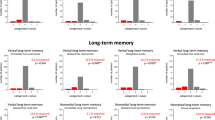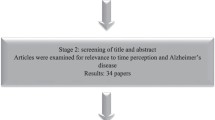Abstract
Introduction
Transient global amnesia (TGA) is defined as a sudden and transient episode of memory loss and accompanied by temporal disorientation. However, the mechanism by which time distortion occurs is not clearly elucidated yet.
Methods
Between March 2019 and November 2020, we subjected 30 TGA patients to several time perception tasks and analyzed their magnetic resonance image (MRI) scans and compared the results with age- and sex-matched control group.
Results
Among the 60 recruited subjects (64.5 ± 6.3 years), 70% were women. Fourteen patients had only anterograde amnesia. Furthermore, 46% of the patients with TGA (n = 14) had a history of Valsalva maneuver, and 70% of the patients (n = 21) had a pre-attack stress factor. The MRI scans of 14 patients (46.67%) showed hippocampal hyperintensity. With regard to the time production task, patients with TGA exhibited shorter times in all trials compared with their counterparts (5 s, 4.90 ± 1.16 vs. 5.53 ± 0.87; p value = 0.02: 15 s, 12.18 ± 4.55 vs. 14.42 ± 2.54; p value = 0.021). For the time comparison task, the number of correct answers given by patients with TGA was significantly lesser than that given by the control group (6.07 ± 1.23 vs. 6.90 ± 1.24; p value = 0.006).
Conclusions
This is the first study to invesgating an altered time perception in patients with TGA. Although the exact neurophysiological mechanism remains unclear, our findings could aid in the elucidation of brain function across specific time frames.

Similar content being viewed by others
Data availability
The datasets used and analyzed during the current study are available from the corresponding author on reasonable request.
References
Allman MJ, Meck WH (2012) Pathophysiological distortions in time perception and timed performance. Brain J Neurol 135:656–677
Anderson JW, Rueda A, Schmitter-Edgecombe M (2014) The stability of time estimation in older adults. Int J Aging Hum Dev 78:259–276
Bartsch T, Alfke K, Deuschl G et al (2007) Evolution of hippocampal CA-1 diffusion lesions in transient global amnesia. Ann Neurol 62:475–480
Brown SW (1985) Time perception and attention: the effects of prospective versus retrospective paradigms and task demands on perceived duration. Percept Psychophys 38:115–124
Bueti D, Walsh V (2009) The parietal cortex and the representation of time, space, number and other magnitudes. Philos Trans R Soc Lond B Biol Sci 364:1831–1840
Cainelli E, Mioni G, Boniver C et al (2019) Time perception in childhood absence epilepsy: findings from a pilot study. Epilepsy & Behav: E&B 99:106460
Chung CP, Hsu HY, Chao AC et al (2006) Detection of intracranial venous reflux in patients of transient global amnesia. Neurology 66:1873–1877
Eichenbaum H (2014) Time cells in the hippocampus: a new dimension for mapping memories. Nat Rev Neurosci 15:732–744
El Haj M, Kapogiannis D (2016) Time distortions in Alzheimer’s disease: a systematic review and theoretical integration. NPJ Aging Mech dis 2:16016
Fofi L, Giugni E, Vadalà R et al (2012) Cerebral transverse sinus morphology as detected by MR venography in patients with chronic migraine. Headache 52:1254–1261
Fontes R, Ribeiro J, Gupta DS et al (2016) Time perception mechanisms at central nervous system. Neurol Int 8:5939
Gil S, Niedenthal PM, Droit-Volet S (2007) Anger and time perception in children. Emotion (Washington, DC) 7:219–225
Grondin S (2010) Timing and time perception: a review of recent behavioral and neuroscience findings and theoretical directions. Atten Percept Psychophys 72:561–582
Han K, Chao AC, Chang FC et al (2015) Obstruction of venous drainage linked to transient global amnesia. PLoS One 10:e0132893
Han K, Hu HH, Chao AC et al (2019) Transient global amnesia linked to impairment of brain venous drainage: an ultrasound investigation. Front Neurol 10:67
Hikosaka O, Miyashita K, Miyachi S et al (1998) Differential roles of the frontal cortex, basal ganglia, and cerebellum in visuomotor sequence learning. Neurobiol Learn Mem 70:137–149
Jang JW, Park YH, Park SY et al (2015) Longitudinal cerebral perfusion change in transient global amnesia related to left posterior medial network disruption. PLoS One 10:e0145658
Kim J, Ghim J-W, Lee JH et al (2013) Neural correlates of interval timing in rodent prefrontal cortex. J Neurosci 33:13834
Kim J, Ghim JW, Lee JH et al (2013) Neural correlates of interval timing in rodent prefrontal cortex. J Neurosci Off J Soc Neurosci 33:13834–13847
Kitamura MAP, Costa LF, Silva DOA et al (2017) Cranial venous sinus dominance: what to expect? Analysis of 100 cerebral angiographies. Arq Neuropsiquiatr 75:295–300
Mioni G, Mattalia G, Stablum F (2013) Time perception in severe traumatic brain injury patients: a study comparing different methodologies. Brain Cogn 81:305–312
Moon Y, Oh J, Kwon KJ et al (2016) Transient global amnesia: only in already disrupted neuronal integrity of memory network? J Neurol Sci 368:187–190
Wearden JH (2003) Applying the scalar timing model to human time psychology: progress and challenges. Time and mind II: Information processing perspectives. Hogrefe & Huber Publishers, Ashland, OH, US, pp 21–39
Yang Y, Kim S, Kim JH (2008) Ischemic evidence of transient global amnesia: location of the lesion in the hippocampus. J Clin Neurol (Seoul, Korea) 4:59–66
Zaharchuk G, Fischbein NJ, Rosenberg J et al (2011) Comparison of MR and contrast venography of the cervical venous system in multiple sclerosis. AJNR Am J Neuroradiol 32:1482–1489
Zidda F, Griebe M, Ebert A et al (2019) Resting-state connectivity alterations during transient global amnesia. NeuroImage Clin 23:101869
Funding
This work was supported by the Basic Science Research Program through the National Research Foundation of Korea funded by the Ministry of Science and ICT (NRF-2018R1C1B5086320); a grant no. 2020–07 from the Kangdong Sacred Heart Hospital Fund; the National Research Foundation of Korea (NRF) grant funded by the Korea government (MSIT) (No.2021R1G1A1012083).
Author information
Authors and Affiliations
Contributions
YK: study concept and design, data analysis and interpretation, drafting of the manuscript, and review of the results. JK: data analysis and interpretation, drafting of the manuscript, and review of the results.
Corresponding author
Ethics declarations
Conflict of interest
The authors declare no competing interests.
Informed consent
Written informed consent was obtained from all participants or from the next of kin when the patient’s agreement was not possible.
Ethical approval
The study was conducted according to the guidelines of the Declaration of Helsinki and approved by the Institutional Review Board from Kangdong Sacred Heart Hospital (IRB no. 2020–10-011).
Additional information
Publisher's note
Springer Nature remains neutral with regard to jurisdictional claims in published maps and institutional affiliations.
Supplementary Information
Below is the link to the electronic supplementary material.
Rights and permissions
About this article
Cite this article
Kim, J., Kim, Y. Distorted time perception in patients with transient global amnesia: time perception task and imaging analysis. Neurol Sci 43, 5951–5958 (2022). https://doi.org/10.1007/s10072-022-06219-0
Received:
Accepted:
Published:
Issue Date:
DOI: https://doi.org/10.1007/s10072-022-06219-0




